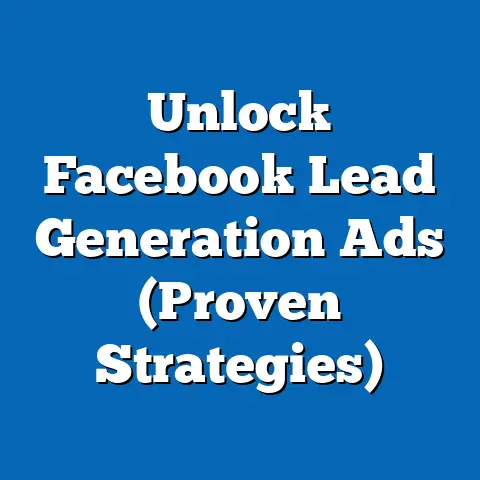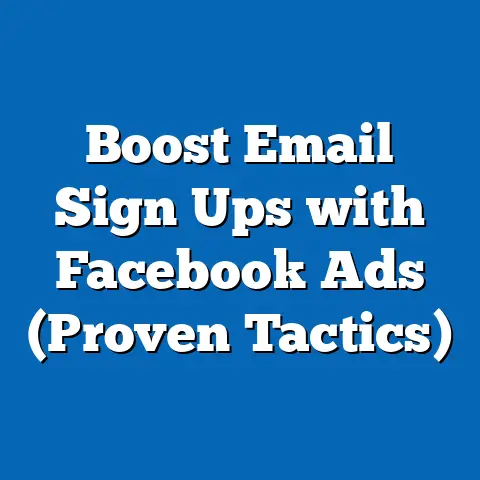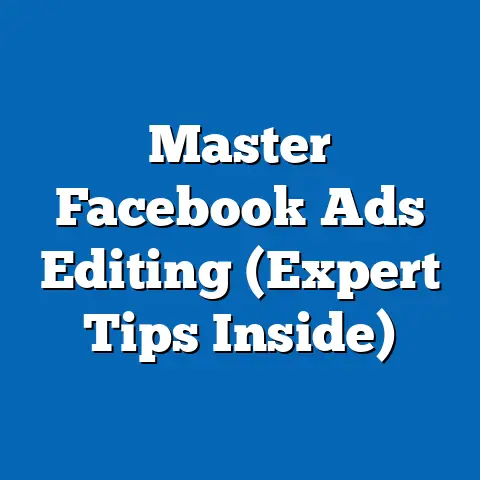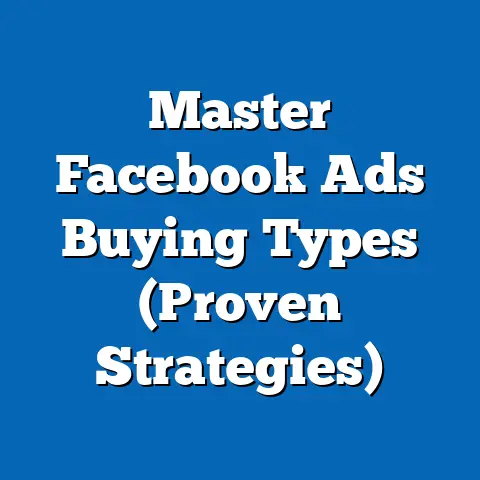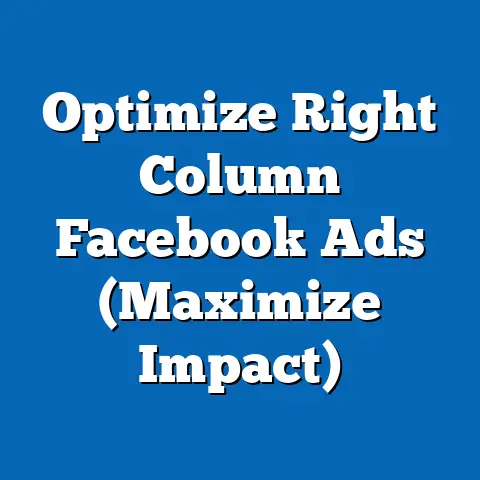Skyrocket Ticket Sales with Top Facebook Ads (Pro Strategies)
The way we buy tickets has changed dramatically.
Gone are the days of solely relying on posters and word-of-mouth.
Now, the entertainment industry thrives on digital purchasing, and at the heart of it all lies social media, particularly Facebook.
I’ve seen firsthand how a well-crafted Facebook ad campaign can be the difference between a sold-out show and an empty venue.
In 2024, the power of Facebook ads for ticket sales is undeniable.
We’re talking about a platform that allows you to target specific demographics, understand audience insights, and even immerse potential customers in your event before they’ve even bought a ticket.
The key is to understand how Facebook ads have evolved and how to best utilize its advanced features.
Recent statistics show a significant increase in online ticket sales, with a large portion attributed to social media marketing.
Let’s dive into how you can leverage Facebook ads to fill seats and create unforgettable experiences.
Understanding the Facebook Ads Ecosystem
The Facebook Ads ecosystem is a comprehensive suite of tools and features designed to help businesses reach their target audiences and achieve their marketing goals.
For anyone looking to boost ticket sales, understanding this ecosystem is crucial.
Different Ad Formats
Facebook offers a variety of ad formats, each with its own strengths and use cases.
Here’s a breakdown:
- Image Ads: These are the simplest form of advertising, featuring a single image with ad copy.
I’ve found them effective for brand awareness or promoting events with strong visual appeal. - Video Ads: Video ads are incredibly engaging and can tell a story more effectively than images.
I always recommend using video for event promotions, showcasing highlights from past events or giving a sneak peek of what’s to come. - Carousel Ads: These ads display multiple images or videos in a scrollable format.
I love using carousel ads to showcase different aspects of an event, such as the venue, performers, and activities. - Instant Experience Ads: These full-screen ads provide an immersive experience for users.
I’ve seen great results using Instant Experience ads to create virtual tours of venues or interactive games related to the event. - Event Response Ads: Specifically designed to promote events, these ads make it easy for users to RSVP directly from the ad.
I’ve found these particularly useful for driving attendance and gathering valuable data on interested individuals.
The Power of the Facebook Pixel
The Facebook Pixel is a small snippet of code that you place on your website to track user behavior.
It’s like a digital detective, helping you understand what people do after clicking on your ad.
- Tracking Conversions: The Pixel allows you to track conversions, such as ticket purchases, sign-ups, or page visits.
This data is essential for measuring the effectiveness of your ad campaigns. - Retargeting: The Pixel enables you to retarget users who have previously visited your website but haven’t yet purchased tickets.
I’ve found retargeting incredibly effective for reminding potential customers about your event and encouraging them to buy. - Optimizing Ads: By tracking user behavior, the Pixel helps Facebook optimize your ads to reach people who are more likely to convert.
The more data the Pixel collects, the smarter your ads become.
Leveraging Audience Insights
Audience Insights is a powerful tool that provides valuable information about your target audience.
It helps you understand their demographics, interests, and behaviors.
- Demographics: Audience Insights reveals demographic data such as age, gender, location, and education level.
This information helps you tailor your ads to specific groups of people. - Interests: The tool also provides insights into your audience’s interests, such as music genres, sports teams, or hobbies.
I use this information to target ads to people who are passionate about the type of event I’m promoting. - Behaviors: Audience Insights uncovers behavioral data, such as purchasing habits, device usage, and online activity.
I find this particularly useful for targeting ads to people who are likely to buy tickets online or attend events similar to mine.
Takeaway: Understanding the Facebook Ads ecosystem, including ad formats, the Facebook Pixel, and Audience Insights, is essential for creating effective ad campaigns that drive ticket sales.
Crafting Compelling Ad Content
Creating compelling ad content is the linchpin of successful Facebook advertising.
You can have the best targeting in the world, but if your ad doesn’t grab attention and resonate with your audience, it won’t drive ticket sales.
I’ve learned that the most effective ads tell a story, evoke emotion, and make people want to be part of something special.
The Importance of High-Quality Visuals and Video Content
Visuals are the first thing people see when they encounter your ad.
High-quality images and videos are crucial for capturing attention and making a positive first impression.
- Professional Photography: Invest in professional photography that showcases your event in the best possible light.
Use images that are clear, well-lit, and visually appealing. - Engaging Video Content: Video content is incredibly engaging and can tell a story more effectively than static images.
Create videos that highlight the excitement of your event, showcase the performers, and give potential attendees a taste of what they can expect. - Mobile Optimization: Ensure that your visuals are optimized for mobile devices.
Most people will see your ads on their phones, so it’s essential that your images and videos look great on smaller screens.
Storytelling Techniques That Capture the Essence of the Event
People connect with stories.
Use storytelling techniques to capture the essence of your event and make it more relatable to your audience.
- Highlight the Experience: Focus on the experience that attendees will have at your event.
Describe the atmosphere, the excitement, and the memories they’ll create. - Showcase the Performers: If your event features performers, highlight their talent and accomplishments.
Share clips of their performances, interviews, or behind-the-scenes footage. - Emphasize the Community: Events are often about bringing people together.
Emphasize the sense of community that your event fosters and how attendees will connect with like-minded individuals.
Writing Compelling Ad Copy
Your ad copy should be clear, concise, and persuasive.
It should highlight the key benefits of attending your event and encourage people to buy tickets.
- Clear Call-to-Action (CTA): Use a clear call-to-action that tells people exactly what you want them to do.
Examples include “Buy Tickets Now,” “Register Today,” or “Learn More.” - Urgency: Create a sense of urgency by highlighting limited-time offers or early bird pricing.
This encourages people to act quickly and avoid missing out. - Benefits Over Features: Focus on the benefits of attending your event rather than just listing the features.
Explain how your event will make people feel, what they’ll experience, and the value they’ll receive.
The Role of Social Proof
Social proof, such as testimonials or user-generated content, can be incredibly effective in building trust and driving conversions.
- Testimonials: Include testimonials from past attendees who had a positive experience at your event.
These testimonials can provide credibility and reassure potential customers that your event is worth attending. - User-Generated Content: Encourage attendees to share their experiences on social media using a specific hashtag.
Then, feature this user-generated content in your ads to showcase the authenticity of your event. - Ratings and Reviews: If your event has positive ratings and reviews on platforms like Yelp or Google, highlight these in your ads to build trust and credibility.
Takeaway: Crafting compelling ad content that resonates with potential ticket buyers is essential for driving sales.
Focus on high-quality visuals, storytelling techniques, clear ad copy, and the power of social proof.
Advanced Targeting Strategies
Targeting is the backbone of effective Facebook advertising.
It’s about ensuring your ads are seen by the right people, those most likely to be interested in your event and purchase tickets.
I’ve found that the more precise your targeting, the higher your chances of success.
Facebook offers a range of targeting options, from broad demographics to highly specific interests and behaviors.
Mastering these options can significantly improve your ad performance.
Custom Audiences
Custom Audiences allow you to target people who have already interacted with your business, either online or offline.
- Website Visitors: Target people who have visited your website, viewed your event page, or added tickets to their cart but haven’t completed the purchase.
This is a powerful retargeting strategy. - Customer Lists: Upload a list of your existing customers or subscribers and target them with ads promoting your event.
This is a great way to reward loyal customers and encourage them to attend. - App Users: If you have a mobile app, target people who have downloaded or used your app.
This is particularly useful for promoting events related to your app’s content.
Lookalike Audiences
Lookalike Audiences allow you to target people who are similar to your existing customers or website visitors.
- Based on Customer Lists: Create a lookalike audience based on your customer list to target people who share similar demographics, interests, and behaviors with your existing customers.
- Based on Website Visitors: Create a lookalike audience based on people who have visited your website.
This is a great way to expand your reach and find new potential ticket buyers. - Based on Page Engagers: Create a lookalike audience based on people who have engaged with your Facebook page.
This is a good option if you have a strong following on Facebook.
Interest-Based Targeting
Interest-based targeting allows you to target people based on their interests, hobbies, and passions.
- Relevant Interests: Target people who are interested in music genres, sports teams, or activities related to your event.
This is a great way to reach people who are already passionate about the type of event you’re promoting. - Competitor Interests: Target people who are interested in your competitors or similar events.
This is a strategic way to steal market share and attract new customers. - Broader Interests: Don’t be afraid to experiment with broader interests that are related to your event.
For example, if you’re promoting a food festival, you could target people who are interested in cooking, dining out, or travel.
Retargeting Strategies
Retargeting is a powerful strategy for re-engaging users who have previously interacted with your event page or website.
- Abandoned Cart Retargeting: Target people who have added tickets to their cart but haven’t completed the purchase.
Remind them about the event and offer incentives to encourage them to buy. - Website Visitor Retargeting: Target people who have visited your website but haven’t taken any action.
Show them ads that highlight the key benefits of attending your event and encourage them to learn more. - Event Page Engager Retargeting: Target people who have engaged with your Facebook event page but haven’t RSVP’d or purchased tickets.
Remind them about the event and encourage them to attend.
Takeaway: Advanced targeting strategies are essential for reaching the right audience and maximizing your ad spend.
Utilize custom audiences, lookalike audiences, interest-based targeting, and retargeting to connect with potential ticket buyers and drive sales.
Optimizing Ad Performance
Creating a great ad and targeting the right audience is only half the battle.
To truly maximize your ROI, you need to continuously optimize your ad performance.
I’ve learned that the most successful advertisers are those who are constantly testing, analyzing, and refining their campaigns.
Facebook provides a wealth of data and tools to help you track your ad performance and make informed decisions.
A/B Testing
A/B testing involves creating multiple versions of your ad and testing them against each other to see which performs best.
- Ad Creatives: Test different images, videos, and ad copy to see which resonates best with your audience.
- Targeting Options: Test different targeting options to see which delivers the highest conversion rates.
- Bidding Strategies: Test different bidding strategies to see which maximizes your reach and minimizes your cost per acquisition.
Monitoring Key Performance Indicators (KPIs)
Monitoring key performance indicators (KPIs) is essential for understanding how your ads are performing and identifying areas for improvement.
- Click-Through Rate (CTR): CTR measures the percentage of people who click on your ad after seeing it.
A high CTR indicates that your ad is engaging and relevant to your audience. - Conversion Rate: Conversion rate measures the percentage of people who take a desired action, such as purchasing tickets, after clicking on your ad.
A high conversion rate indicates that your ad is effectively driving sales. - Return on Ad Spend (ROAS): ROAS measures the revenue generated for every dollar spent on advertising.
A high ROAS indicates that your ad campaign is profitable.
Using Facebook Analytics
Facebook Analytics provides deeper insights into ad performance and audience behavior.
- Audience Demographics: Understand the demographics of people who are engaging with your ads.
This information can help you refine your targeting and tailor your ad content to specific groups. - Website Traffic: Track the traffic that your ads are driving to your website.
This information can help you understand how your ads are contributing to overall website performance. - Conversion Paths: Analyze the paths that people take before converting.
This information can help you identify opportunities to optimize the customer journey and improve conversion rates.
Takeaway: Optimizing ad performance is an ongoing process that requires continuous testing, monitoring, and analysis.
Utilize A/B testing, monitor key performance indicators, and leverage Facebook Analytics to gain deeper insights into your ad performance and audience behavior.
Leveraging Facebook Groups and Event Pages
While paid advertising is powerful, don’t overlook the potential of organic reach through Facebook Groups and Event Pages.
These platforms can be valuable tools for promoting your event, fostering community engagement, and driving ticket sales.
I’ve seen events that have generated significant buzz and attendance simply by leveraging the power of these free tools.
Creating an Event Page
An event page serves as a central hub for information and engagement.
- Detailed Information: Provide detailed information about your event, including the date, time, location, performers, and activities.
- Engaging Content: Share engaging content such as photos, videos, and behind-the-scenes footage.
- Community Interaction: Encourage users to share and invite friends.
- Promote Ticket Sales: Make it easy for users to purchase tickets directly from the event page.
Utilizing Facebook Groups
Facebook Groups can foster community engagement and boost organic reach.
- Create a Group: Create a Facebook Group dedicated to your event or the type of event you’re promoting.
- Engage with Members: Share relevant content, ask questions, and encourage discussion among members.
- Promote Your Event: Promote your event within the group and offer exclusive discounts to members.
- Build a Community: Focus on building a community of passionate fans who are excited about your event.
Takeaway: Facebook Groups and Event Pages can be valuable tools for promoting your event, fostering community engagement, and driving ticket sales.
Utilize these platforms to connect with potential attendees and build a loyal following.
Conclusion
In 2024, Facebook advertising remains a powerful tool for event organizers looking to skyrocket ticket sales.
By understanding the Facebook Ads ecosystem, crafting compelling ad content, implementing advanced targeting strategies, optimizing ad performance, and leveraging Facebook Groups and Event Pages, you can effectively reach your target audience and drive conversions.
Remember that the key to success is to stay updated with evolving trends and continuously refine your advertising strategies.
The digital landscape is constantly changing, and it’s essential to adapt your approach to maintain a competitive edge.
With the right approach, you can not only increase ticket sales but also build a loyal community around your brand, ensuring the success of your event for years to come.
So, go forth, experiment, analyze, and watch those ticket sales soar!

